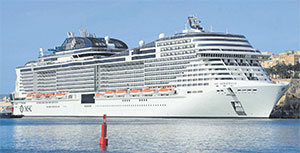
|
|
|
|
|
|
|
|
|
|
|
|
|
|
|
|
|
| Features |
A long-term tourism response will be required once the coronavirus passes PUBLIC HEALTH is a matter for governments. It is an issue which requires populations to trust those who are delivering solutions. It is a matter about which industries, no matter how eco- nomically significant, cannot immediately do much, other than to engage in a careful dialogue with Government and health partners on the measures necessary to first protect a country, and then the industry that now dominates much of the Caribbean economy. After a slow start, Caribbean govern- ments are now taking the difficult decisions necessary to stem the spread of COVID- 19, the coronavirus. They have agreed a common protocol, but the reported incidence of the virus in the Dominican Republic, Cuba, French Guiana, Guyana, Jamaica, Martinique, Puerto Rico, St Barths, St Martin and St Vincent suggests that the region may be unable to avoid the broader short-term public health consequences. In an indication of how serious COVID- 19 could be for Caribbean tourism, St Lucia’s Prime Minister, Allen Chastanet, has said that his government is modelling various scenarios, including a potential fall in arrivals of between 50 to 80 per cent. In addition, commenting recently on the known impact of the virus on arriv- als, Omar Robinson, the President of the Jamaica Hotel and Tourist Association (JHTA), recently told Hospitality Jamaica that the industry was in for “a rough ride”, with a possible 40 per cent decline in visi-tor numbers this summer. He also indicated that it was likely that many incentive group visits and events would also be put on hold. At the same time, Prime Minister Andrew Holness has indicated that some thought has been given to halting flights from the United Kingdom (UK), given the rapidly rising incidence of cases in Britain: a politically complex decision, if taken, in the light of the regular travel ‘home’ by the island’s large older diasporic commu- nity, and the country’s growing UK visitor market. STIFLED PROGRESS For her part, Barbados’ Prime Minister, Mia Mottley, has warned that the impact on arrivals and the economic consequences will be difficult to contain and may affect the positive progress the island has been making with its International Monetary Fund (IMF) programme. In a further indication of the problems ahead, the US government has suggested that its citizens should avoid all cruises and overseas travel, and the airlines and the cruise companies have begun to dramati- cally reduce their services. In addition, the US president announced unilaterally that the “foreign virus” meant that air travel from the EU Schengen zone by “most foreign nationals” will be halted. It is a decision that will not only impact directly on the tens of thousands of European visitors who daily transit the US to Caribbean destinations, and ignores the evidence of how rapidly the virus is spreading in the US, but bodes ill for any other nations that President Trump regards as posing a risk. Although the industry in the Caribbean and elsewhere is preoccupied with the immediate economic impact, the World Travel & Tourism Council (WTTC), an industry body rep-resenting some of its biggest global players, has begun to think about the positive responses when the immediate threat has passed. Observing that global travel could be hit by a 25 per cent decline in 2020 and that between 12 and 14 per cent of industry jobs are at risk, it suggested several measures that could help recovery. These, it said, might include facilitating travel by making it seamless and secure; alleviating pressure at ports and airports; reducing or removing taxes on travel, including airport, port and other related taxes; and providing fiscal relief and incentives that support smaller tourism-related businesses negatively im- pacted by the virus. The WTTC also proposes, in due course, that destinations and the industry increase their budgets and resources for promotion, marketing and product development, and develop stronger public-private partnerships and greater international cooperation as the industry recovers from the impact of COVID-19. At the moment, all Caribbean gov- ernments and the industry are trying to assess the immediate threat, but when the moment comes, these are all ideas worthy of consideration. In addition, the Caribbean is already in dialogue with the major international financial institutions, including the World Bank and the IMF, about possible responses and support. However, it is hard to avoid the con- clusion that the impact of COVID-19 on tourism, and the probability, in a world rapidly moving towards a recession and a loss of global confidence, the Caribbean is about to experience an economic shock. Recovery will require significant adjust- ments of exactly the kind the WTTC is proposing if the region is to retain its role as a major tourism destination. |
Copyright © 2019 The Gleaner Company (Media) Limited. A member of the RJRGLEANER Communications Group. All Rights Reserved
Gleaner
Company | Produced by Go
Jamaica
Hospitality Jamaica is updated every two (2) weeks
Privacy Policy
